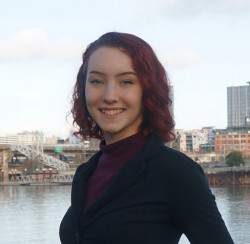Building ‘Hygiene Hubs’ for Houseless Residents
Three recent alums have served at Hygiene4All, a Portland-based nonprofit that works to ensure those who are unsheltered have equal access to basic resources like hot showers, trash disposal, and first aid.

In 2020, Hygiene4All opened its first bright blue hub under the Morrison Bridge, a place where houseless Portlanders could come and access critical resources, such as hot showers, public bathrooms, basic medical care, and laundry services. These hygiene hubs are designed to foster community connection and respect across the housing divide that has captured the city’s political consciousness over the last several years.
The seeds of the nonprofit began in 2018, when the Central Eastside Industrial Council petitioned the City of Oregon to form an “Enhanced Service District” that would enable the private policing of houselessness in the area. Over the next two years, an alternative solution began to take shape, led by the emerging Hygiene4All in collaboration with unsheltered residents, local nonprofits, and other grassroots organizations. In these early days, Zack Hart BA ’21 was brought on as Hygiene4All’s first hub director.
“Houselessness is made out to be a complex issue, but in some ways, it’s really not,” Hart said. “We need to simply provide a compassionate, smart solution.”

Last September, Isabel McTighe BA ’22 became the latest Lewis & Clark alum to join the staff as a site coordinator. Hart continues to be an active part of the organization’s development, which they call “another home.”
Platt, a psychology major, draws a natural connection to her work at Hygiene4All and close involvement in community-driven work as a Lewis & Clark student. As a first-year student, she volunteered with the Maybelle Center for Community through the college’s Center for Social Change and Community Involvement, visiting those in low-income housing experiencing social isolation. Later, she took a course with Assistant Professor With Term Amelia Wilcox on psychiatric health, which offered a deeper look at the systems of oppression involved in mental health, including houselessness.
“At Hygiene4All, there is a lot of advocacy at the city level to push back against anti-houselessness policies, which goes hand-in-hand with the everyday work,” Platt said. “That’s what drew me to the organization––its appreciation of the systems that are stacked against people, as opposed to blaming the problem on individual decisions people make.”

“We were teaching each other about how to live and work together and taking responsibility for our well-being as a group,” McTighe said. “It’s a value I see reflected in my work at Hygiene4All: showing up for the people you’re in community with.”
For Platt and McTighe, who are both Portland natives, there is a hope that Hygiene4All continues to grow with intention, creating additional hubs throughout the city and acting as a model that can be emulated elsewhere.
“I hope the philosophy spreads more than anything,” Platt said. “I think a lot of folks look away from the unhoused community and avoid talking about it because it’s painful and scary. But if more people saw unhoused folks as their neighbors and as their community, we would treat them better.”
This is a sentiment shared by Hart and McTighe. “We are our neighbors,” McTighe added. “The people in our community are us.”
Donate to Hygiene4All, and explore ways to volunteer at the organization.
Hygiene4All Center for Social Change and Community Involvement Psychology
More Stories

Sneaker Law
Stepping Into a New Era of Legal Education
Sports and entertainment attorney Nic Mayne teaches a new Sneaker Law course at Lewis & Clark Law School, providing hands-on contract drafting experience through the lens of the athletic footwear industry.

Climate Change
New Scholarship for International Environmental Law LLM Students
The Karuna Foundation recently funded a new scholarship for students from the Himalayan region. The scholarship—the first of its kind for the environmental program—will provide significant funding for an international student with a passion for environmental law and climate change mitigation.

Prosperous Portland
An L&C Leader for Portland’s Small Business Community
Lewis & Clark’s Entrepreneur in Residence Mitch Daugherty has been tapped to lead Portland’s newly created Office of Small Business, helping to connect small business owners with the resources they need to thrive.

Beyond Divisions
21st Annual Ray Warren Symposium Explores the Concept of Borders
This year’s Ray Warren Symposium on Race and Ethnic Studies, held November 13-15, is titled On the Border. It will examine the different borders we experience, the role of borders in our lives, and the relationship between borders and ideas of race and ethnicity.
